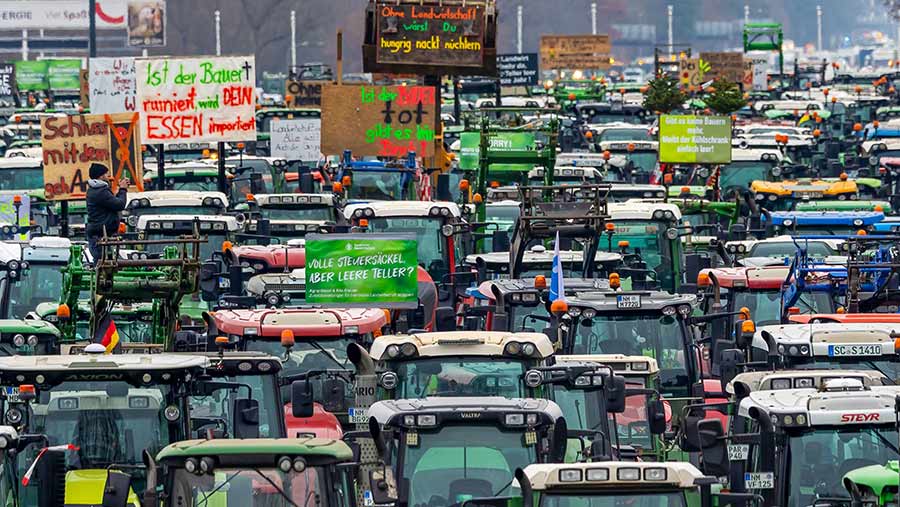Opinion: Blackmail through tractor blockades is ineffective
 © Imago/Alamy Stock Photo
© Imago/Alamy Stock Photo We had a couple of new tractors delivered at the end of December. You can tell how excited I am about this from the fact that I haven’t even been to look at them yet.
They are locked in one of the sheds, ready for the spring.
I’m someone whose passions are not aroused by new tractors. I care whether they do their job well and about things like operating costs and reliability.
See also: Opinion – an alternative model for succession planning
I want our operators to be happy with their machines, so they take pride in them. I’m also fond of maximising tax relief, but I approach purchasing tractors with the same level of emotion with which I would buy a washing machine.
I try to buy the smallest, lightest tractor that will do the job.
After a bad experience with Fendt tractors, we switched our whole fleet to John Deere last year and will now adopt a simple strategy of updating two tractors every year to stop any of them becoming more that four years old.
I prefer talking to salesmen rather than workshop managers.
I’m envious of tractor enthusiasts; I wish I had a hobby that was tax-deductible.
I marvel how, at a time when we need to reduce carbon emissions and where we find it hard to afford to maintain rural roads, tractor runs and rallies are still allowed to operate with subsidised diesel and without paying any road tax.
Anyway, I’m not supposed to be stirring that pot, this column is meant to be about the European tractor protests.
In January, German farmers brought Berlin to a standstill with tractor blockades to complain about rising fuel costs.
I don’t agree with their actions. If I wanted to make a point about the cost of diesel, I wouldn’t do it by burning more than 20 litres an hour of the stuff driving a tractor into a city centre.
French farmers are about to launch similar protests. I hope the trend doesn’t reach these shores.
Action like this is an effective way of getting attention, but it is also a form of blackmail.
Very few farmers feel sympathy for – or solidarity with – Tube drivers striking or Extinction Rebellion protesters glueing themselves to the tarmac.
If we don’t respect these tactics from other people, we shouldn’t employ them ourselves.
The people who get inconvenienced are our customers and it’s a pyrrhic victory if we alienate them.
The problem that affects farmers is not that our costs are too high or that regulation is too great.
It’s that we often sell products at prices which leave us unprofitable. It wouldn’t actually matter how high our costs were if were making an appropriate margin.
It makes the problem worse if a government capitulates to protests and gives farmers more subsidisation.
It perpetuates the cycle of low sales prices. I would be happy to pay appropriate costs for my inputs and for the external impacts of my production if I could pass them on to my customers with a profit on top.
I recognise the huge difficulties and frustrations that some farmers face, but I hope we can find a way to be a solution to society’s problems rather than a noisy, polluting addition to them.

